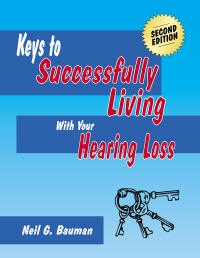Question: I hear the terms “hearing impairment,” “hearing handicap” and “hearing disability” used seemingly interchangeably. Why do we have these terms if they all mean the same thing?—N.
Answer: Good question! Actually, they don’t mean the same thing at all, hence the confusion. The American Academy of Otolaryngology (AAO) carefully defined each term. I think you’ll find these differences most interesting for they relate to how society values and views our worth.
Hearing Impairment
Hearing Impairment is any deviation from “normal” for the worse-whether in structure or in function. Therefore, any degree of hearing loss is a hearing impairment. So too are all the other strange conditions we have that are associated with “damaged ears” such as tinnitus, hyperacusis, recruitment, less than perfect discrimination, etc. It covers the whole range of hearing loss from mild to totally deaf.
Hearing Handicap
Hearing Handicap is the disadvantage imposed on hard of hearing people by society such that it affects our efficiency in our daily lives.
Even though we may have hearing losses (hearing impairment), we do not have to be handicapped if we live in a society that is sensitive to our needs! For example, years ago on Martha’s Vineyard there were many people who were deaf. These people would have been severely handicapped in a “normal” society. However, a wonderful thing happened. Everyone on the island learned to sign, so whether you were deaf or hearing you had no trouble communicating with any one. Thus, the deaf people there were not handicapped even though they couldn’t hear.
Another example-if all television programs were captioned, then whether we hear well or not doesn’t make any difference-we can all understand the programs. As a result, we would not be handicapped in this situation.
When society fails to meet our unique needs as hard of hearing people, we end up handicapped. This handicapping is not the fault of our hearing losses as such, but from society not “leveling the playing field” so we can live in society as equals.
Hearing Disability
This brings us to the third term, “Hearing disability.” Hearing disability is “an actual or presumed inability to remain employed at full wages.” Hearing disability only comes about when society fails to meet our needs and thus handicaps us so it is difficult for us to compete fairly in a hearing society. In a nutshell, hearing disability is how society views our “worth.”
Do you want to know how much you are worth as a hard of hearing person in our society? If so, keep reading and I’ll show you how “they” figure it out.
In 1979, the AAO came up with a formula that defines their concept of the degree of disability we suffer as a result of a hearing loss. Thirty-two of the 50 states now use this formula as the basis for their compensation awards.
Here is how to determine the amount your hearing loss would likely affect your ability to earn a “normal” salary in today’s society according to the AAO formula. All you need to determine your worth is a copy of your audiogram and a calculator.
Step 1
Determine your average hearing loss in decibels for each ear using these four frequencies-500 Hz, 1,000 Hz, 2,000 Hz and 3,000 Hz. (Note: if your hearing at any of these frequencies is better than 0 dB, use 0 dB and if your hearing is worse than 100 dB, use 100 dB.) I’ll use my hearing loss as an example so you can see how it is done. Follow along using your own figures.
You’ll find the hearing loss for your right ear marked on your audiogram with red circles and your left ear marked with blue Xs. (Ignore any other marks such as red triangles, blue squares or angle brackets like < or >.)
Frequency Right ear Left ear
500 Hz 65 65
1,000 Hz 75 75
2,000 Hz 65 70
3,000 Hz 60 65
Add the figures up for each ear and divide by 4 to get the average. (Round your answer to the nearest whole number.)
65 + 75 + 65 + 60 = 265/4 = 66 average dB loss in right ear.
65 + 75 + 70 + 65 = 275/4 = 69 average dB loss in left ear.
Step 2
Calculate the degree of impairment for each ear. The assumption is that a hearing handicap doesn’t begin until you have at least a 25 dB loss. The handicap then increases by 1.5% for each dB loss above 25 dB. To determine this, take the average you calculated in Step 1 and subtract 25 from it. If the answer is greater than zero, multiply the result by 1.5. Do this for each ear. (If your loss in both ears is less than or equal to 25 dB you don’t have any hearing handicap according to the AAO.)
Right ear: 66 – 25 = 41 x 1.5 = 61.5% handicap
Left ear: 69 – 25 =44 x 1.5 = 66% handicap
Step 3
In this step, you apply a 5 to 1 weight favoring your better ear, then you combine the results to obtain the final figure. (If your better ear has a hearing loss of 25 dB loss or less, and your worse ear is greater than 25 dB, simply take the result of your worse ear and divide it by 6 to get the final answer [and skip the next paragraph].)
To calculate your hearing disability, take the smaller figure from Step 2 (your better ear) and multiply it by 5. Add this to the figure of your worse ear from Step 2. Add these two numbers together and divide the result by 6. That is your hearing handicap as a percentage.
Better ear 61.5 x 5 = 307.5
Add together 307.5 + 66 = 373.5
Divide by 6 373.5/6 = 62%
According to this formula, I have a hearing handicap of 62%. This means that my expected earning capacity would be 62% below “normal” and this could be the basis for compensation if I were eligible.
In other words, my value to society is only 38% (100 – 62 = 38%) when compared to a person with normal hearing. Therefore, I could expect to only earn (on the average) 38% as much as a person with normal hearing according to the AAO. Let’s say that the average salary today is $40,000.00. Instead of bringing home that amount, I could expect to only take home 38% of that, or $15,200.00.
All too often this is the reality. There are several studies that show that deaf and hard of hearing people are consistently underemployed and underpaid.
On top of all this, there are some serious flaws in this formula. Notice that it fails to take into consideration whether we can understand what we hear. This is called discrimination. (All of us with sensorineural hearing losses have discrimination problems to one degree or other.) We may be able to hear pure tones for the audiogram, but if we cannot understand speech well (or at all) because of poor discrimination we are essentially deaf-yet we could be compensated as though we could hear and understand at the level our audiograms indicate. Also, if we suffer from tinnitus or recruitment or hyperacusis-we may not be able to function well in society-but supposedly we can “hear” so no allowance is made for these factors either.
If you ever find yourself in the situation where your hearing disability is being figured out, make sure they take into consideration not only your hearing handicap as calculated, but also all the other factors that make up your hearing picture. In the final analysis, determining your hearing disability is an “administrative decision” although it is greatly influenced by the results of this hearing handicap calculation. What this means in practice is that the person determining your hearing disability has the discretion to consider any other factors and either increase or decrease your hearing disability percentage.
So there you have it. Whether you like it or not, and whether you think it fairly reflects your status in the workplace or not, that is how “they” calculate your “worth” to society.
Reference
Rosen, Elizabeth, Jeffrey Vrabec & Francis Quinn. January 10, 2001. Noise Induced Hearing Loss. Grand Rounds Presentation, NTMB, Dept. of Otolaryngology.http://www.utmb.edu/otoref/Grnds/Hear-Loss-Noise-000110/Hear-Loss-Noise.pdf.



right ear speech discrimination 72 decibel left 88 and average 64 what % of hearing loss do I have?? thank you good health fred
Hi Fred:
You haven’t given me the information I need in order to calculate your hearing disability. To do that I need all the figures on your audiogram for each ear–hearing loss by frequency.
But in any case, you can’t measure hearing loss in percentages. What this calculation does is tries to express your degree of hearing loss in relation to what you are worth to an employer as a hard of hearing person.
Cordially,
Neil
left 68 70 69 80
right 70 65 69 80
I’am turning 60 yrs old dec.
I still work should I think about going out disabily I make about 43,000 a year
Hi Robert:
Why go on disability. From your audiogram, I’d say that hearing aids should significantly help you. There is no reason to go on disability just because you have trouble hearing. You need to learn how to successfully live as a hard of hearing person and use the necessary technology available–hearing aids and assistive technology–and ask your coworkers to accommodate your hearing needs.
Cordially,
Neil
Current test
Left: 45, 75, 75, 65
Right: 60, 95, 120, NR115
(the chart I was given shows NR’s with different numbers for 3k to 8k)
Was told a hearing aid would not help with right ear and left could benefit from an aid.
I wanna contact you.
Hi Nikita:
Go ahead. My contact information is at the bottom of every page in the HearingLossHelp.com website.
Cordially,
Neil
I wear hearing aids but still have trouble understanding my soft spoken wife who refuses to talk louder. It’s very frustrating to go through this. Most other people talk loud enough.
L: 40, 50, 50, 60
R: 40, 50, 55, 70
Maybe a $7000 pair might be better than than the $4000 Siemans REC ones I have. I have very loud tinnitus I hear even outside in the city.
Hi Robert:
You don’t have to spend $7,000 to get hearing aids that have enough power for you. $4,000 or less a pair should get you very good aids. Maybe you need the ones you have adjusted to give you more volume. Or if you have 3 or 4 memories in them, have one memory programmed specifically to let you hear your wife the best. I have to have such a program for people that speak softly, but it is only useful in quiet environments as other sounds may be too loud.
Your tinnitus shouldn’t stop you from hearing other sounds. It’s just annoying to try to hear through the tinnitus racket if it is too loud. I’m so used to my tinnitus that I seldom notice it if I am wearing my hearing aids.
Cordially,
Neil